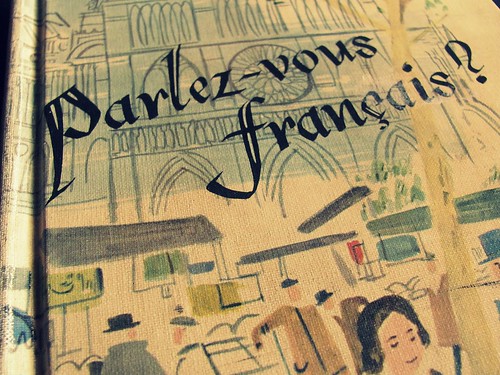Interview: How to use French Poetry to Improve Your French

Camille, in your opinion, what are the best ways for French students to improve their pronunciation?
First, students should know the rules of French pronunciation: many students have just learned by mimicking a teacher or a recording, but they don’t know why something is nasal or not, or why we say ‘Asie‘ (‘azee’) but ‘assis‘ (‘assee’).
These rules are particularly important when the students read out loud. Once you master the rules, repetition is the key: mimic a native speaker, repeat a couple of sentences imitating the voice modulation and studying where the speaker breathes. Then train on the difficult sounds such as ‘aille’, ‘ille’, ‘euille’ and ‘u’; train your brain to read fast all the little words: le, la, les, un, une, des, et, est…
A good thing to do when you study pronunciation is to exaggerate: enunciate a lot, the French way, as if you were ‘mocking’ a French person. You are not used to using your face muscles and mouth that way, and it will first sound weird to your ear to hear these sounds coming out of you, but it will help your accent in the end.

What are the particular strengths of listening to and learning music and poetry to aid pronunciation?
It’s catchy. The music is catchy, the rhyme is catchy, it helps your brain memorize better. Plus it’s more fun, and makes you feel you are really immersing in the French culture and its language.
Some people are daunted by poetry, even in their own language. What advice would you give to them?
Give it a try, and if you don’t like it, then find another tool to learn French. Not everybody likes poetry, and that’s OK. I don’t like Opera. I understand it’s beautiful and all, but I just don’t appreciate it. To each his own… Now, there are some opera ‘songs’ that I really enjoy: the same could go for you and poetry. You might not like classical poems, but respond to the sensuality of Baudelaire, or the musicality of Valery, or the strong social messages of La Fontaine. You won’t know if you don’t try.
Can you recommend some accessible French poets?
Jacques Prévert comes to mind: he is one of the most studied poets in elementary schools. Paul Eluard’s poems also tend to be shorter and easier to understand.
On FrenchToday, you have a huge poetry reading section that is also available as a free podcast subscription (Easy French Poetry Podcast) and also your product Easy French Poetry. Can you describe both the section/podcast and the product?
It’s easy to find French poetry on the web, but most comes without audio. Or the audio is not of great quality. I wanted to give something back to the community, and record the poems slowly enough that students of French could really use them to study pronunciation.
We have such a large patrimony of poems, and the Classics are not copyrighted, so they’re the perfect tool. In the poetry reading section, I now have over 40 classical poems (and growing) : Baudelaire, Appolinaire, Eluard, Valery, Labé, La Fontaine, Claudel. Some articles feature only a slow and personal reading of the poem, others have the author’s life, or a short analysis of the poem, all in easy French.
The three volumes of Easy French Poetry Reading and Analysis use poetry to help intermediate and advanced students improve their French: I use everyday French to explain word by word, and then analyze the most famous French poems. A lot of intermediate students are not able to follow a movie in French; but a movie is long, and you cannot go from handling a short conversation in French to understanding a two-hour-long movie!
You need to train your brain to stay focused on longer – yet reachable – audio material. It is exactly for that purpose that I developed these explanations. Of course, you will learn a lot about French poetry, and this is definitely something poetry amateurs will enjoy, but I strongly believe it’s also a unique tool to improve your French, whether you like poetry or not. As I said, you won’t know until you try!
You can sample the whole analysis of Le Corbeau et le Renard de Jean de La Fontaine on this page: http://www.frenchtoday.com/poem-analysis-reading/poem-le-corbeau-et-le-renard-la-fontaine (full French and English transcripts and 22 minutes of matching audio).
Thank you Camille for taking the time to speak to us at My French Life™. We’ve enjoyed getting to know more about you and your love for poetry.







A superb idea, really ! Of all the French I recall learning in my youth, the things that have stuck with me the most are the poems and songs !